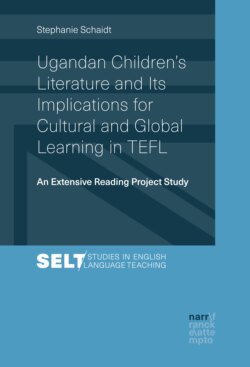Читать книгу Ugandan Children's Literature and Its Implications for Cultural and Global Learning in TEFL - Stephanie Schaidt - Страница 32
На сайте Литреса книга снята с продажи.
4.4.2.4 Empowering the Girl Child
ОглавлениеSince the foundation of the Ugandan Women’s Writers Association FEMRITE by Honorable Mary Karoro Okurut in 1995, women writing gained in importance in Uganda. The mission of the NGO is “to build a sustainable platform for Ugandan women to contribute to national development through creative writing” (FEMRITE, n.d.). It wants “to create an enabling atmosphere for women to write, tell and publish their stories” (Twongyeirwe, 2009, p. xiii). FEMRITE organises activities such as weekly book clubs, workshops and radio or television programmes. It works together with schools and teachers and tries to promote a reading culture in the country (Kruger, 2011, p. 6). The association also has a small resource centre and a publishing unit. The support network of the organisation has shaped the careers of the writers. By now, many of the members of FEMRITE have gained national and even international reputation and have won prestigious literary awards (ibid., p. 3).
In Ugandan women’s writing, readers are exposed to new topics and experiences which were not common in Ugandan literature before. Female protagonists, who were formerly underrepresented in Ugandan writing, are increasingly used in the texts. In addition, female vulnerability and female silence enforced by society, but also female strength and revolt against conventions, are focalised. Moreover, established stereotypes and gender inequality in society are attacked and the women writers make a clear “power bid” (Kiyimba, 2008, p. 219).
In traditional Ugandan society, women were known as “carriers of ‘tradition’” (Kiguli, 2007, p. 171). They were usually considered responsible for the upbringing of children which included the telling of stories.1 Thus, it is not surprising that most writers of Ugandan children’s fiction are actually women; indeed, the very first writer who wrote for children in Uganda, Barbara Kimenye, was a woman.
Ugandan women writers write about various topics; frequently, however, their narratives focus on the girl child. They, for example, talk about girl child education, teenage pregnancy, young adult marriage, sexual abuse by adults and the issue of sugar daddies in their stories. Ugandan women writers can be considered to have a different approach to writing about women’s topics than their Western counterparts. They see things, as the Nigerian writer Buchi Emecheta expressed it, “through an African woman’s eyes” (2007, p. 553). Emecheta remarked at a conference:
if I am now a feminist, then I am an African feminist with a small f. In my books I write about families because I still believe in families. I write about women who try very hard to hold their family together until it becomes absolutely impossible. (Ibid.)
I want to illustrate this with an example. In a group interview with UCWIA, when confronted with the question whether they consider folktales like Njabala2 that portray Ugandan women in an unfavourable light as still relevant for children today, the women writers present answered in the affirmative. They stated that they consider folktales which teach girls how to behave like “African women” as very important. Rose Rwakasisi explained:
We want our girls to grow up as African women, educated or not. […] And for us now, we are worried. The boys today are not developing into African men and the girls not into African women any longer. And that’s why we try to bring them back to the African way.3
There are, however, also many Ugandan narratives whose major aim it is to empower the girl child. I Will Not Fail (Kisubi, 2008), for example, tells the story of Namukose who grows up in a society that does not approve of girls going to school. In a village meeting, comments such as “You don’t gain anything by educating a girl. The only people who gain are the family she will get married into.” (ibid., p.2) or “You want to educate girls? Don’t you know that a girl’s place is in the kitchen? Why waste time and money on a girl?” (ibid.) are made. The introduction of Universal Primary Education in Uganda still gives Namukose the chance to go to school and she is a very successful student. Constantly encouraged by various strong women, i.e. her mother, her class teacher and Dr. Robinah Kalembe, a head of faculty at Makerere University, Namukose manages to complete primary school as the best student at her school and wins a scholarship that takes her through secondary school and university education.
Despite the gender stereotypes and setbacks Namukose faces, she succeeds in achieving her dreams. Namukose may, therefore, serve as a role model for girls who read the novella. In the author’s note, Kisubi states that the narrative intends to be “an inspiration to all girl-children from all walks of life, from every community, and from every society where a girl has the same challenges in life and should be given the same opportunities” (ibid., p. iii).
